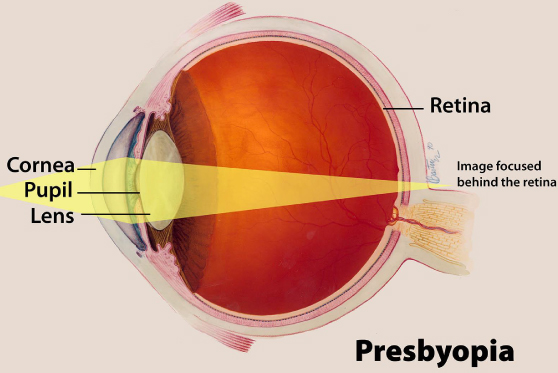Presbyopia Farsightedness
Presbyopia is an age-related condition that occurs when your eyes gradually lose the ability to see or focus on nearby objects. It is caused by a loss of elasticity in the lens of a person’s eye. As the eye ages, the lens begins to harden, causing it to be less flexible. Subsequently, the lens cannot adjust to focus on images that are close up. When the lens loses the ability to change shape, nearby images can appear out of focus. Even though vision issues are a common consequence of age, there are steps that you can take to protect your vision and find the perfect visual aids for your individual condition.

Symptoms of Presbyopia
Presbyopia develops gradually, and it might take quite some time before you notice a loss of vision. The following symptoms are good indicators that you may be exhibiting the early signs of presbyopia.
- Adjusted Reading Habits. Those with presbyopia may notice that they are suddenly holding their reading materials farther away from their eyes or may require the use of a brighter light.
- Blurred Vision. Those with presbyopia may experience blurred or distorted vision while reading at a normal distance.
- Eye Strain. After working on close-up projects for an extended period of time, those with presbyopia may experience eye strain and headaches.
Premature Presbyopia
Certain drugs or diseases to cause symptoms of presbyopia in people younger than 40. These instances are called premature presbyopia. This means that if you notice symptoms of presbyopia at an early age, you may suffer from an underlying medical condition. The following conditions can contribute to the appearance of premature presbyopia:
- Eye Trauma
- Poor Blood Flow
- Anemia
- Cardiovascular Disease
- Diabetes
- Hyperopia
Treatment for Presbyopia
The loss of the ability to focus on close objects is a common side effect of aging. By the age of 40, most people have experienced some variation of vision loss. Presbyopia affects some people more than others, which is why it is important to schedule a regular eye exam. Prescription and nonprescription lenses are common treatments for presbyopia. For very mild cases of presbyopia, nonprescription lenses may be a good first step towards correcting your vision. For more advanced cases, an eye doctor will work with you to find the appropriate magnification.

